
50 years of Confessions
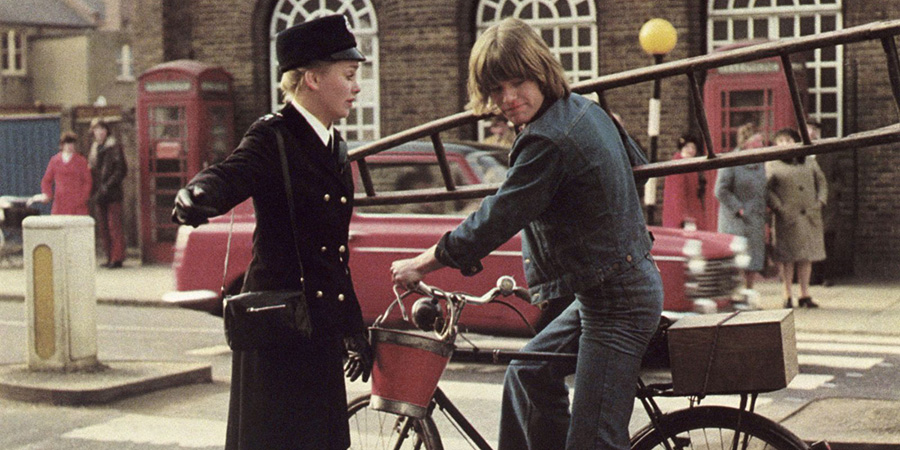
'Revealing'. 'Racy'. 'Riotous'. So screamed the cinema trailer for the smash hit British sex comedy Confessions Of A Window Cleaner, which became the highest-grossing UK film in the year of its release, 1974.
The Confessions films were based on an established series of books by Christopher Wood, written in an autobiographical style and promoted as being penned by the star character, 'Timothy Lea', an innocent, good-looking lad who just wanted some action and to discover the world of women and sex. The initial book, Confessions Of A Window Cleaner, was written in 1971 - by 1974 it had become the first of four films that shook and saved the British film industry in equal measure.
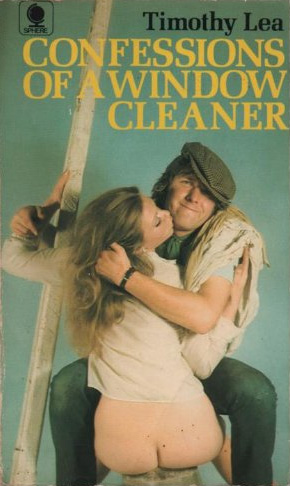
To understand how cinema had reached the point of cheap, saucy titillation, we must first dial back to the late 1960s. Following the wave of societal changes across the decade - political satire, permissiveness and reams of counter-culture - there had been a relaxation of censorship laws as audiences now desired a more sophisticated, adult choice of films. In the early 1970s the BBFC (then the C stood for 'Censors', not 'Classification' as today) increased the minimum admission age of an X certificate film from 16 to 18, and controversial productions like Straw Dogs and A Clockwork Orange, both released in 1971, were exposing moviegoers to more explicit and extreme content.
By this point the Carry Ons were starting to look cosy and dated, and the British film industry was in decline, often dependent upon American backing but unable to compete with American blockbusters; meanwhile, restrictions still imposed legal requirements for cinemas to show certain amounts of British-made movies in ratio to imported titles. Britain exited the swinging sixties with a continued appetite for change, but the public still wanted a damned good laugh when they went out for a night at the pictures.
Enter Timmy Lea.
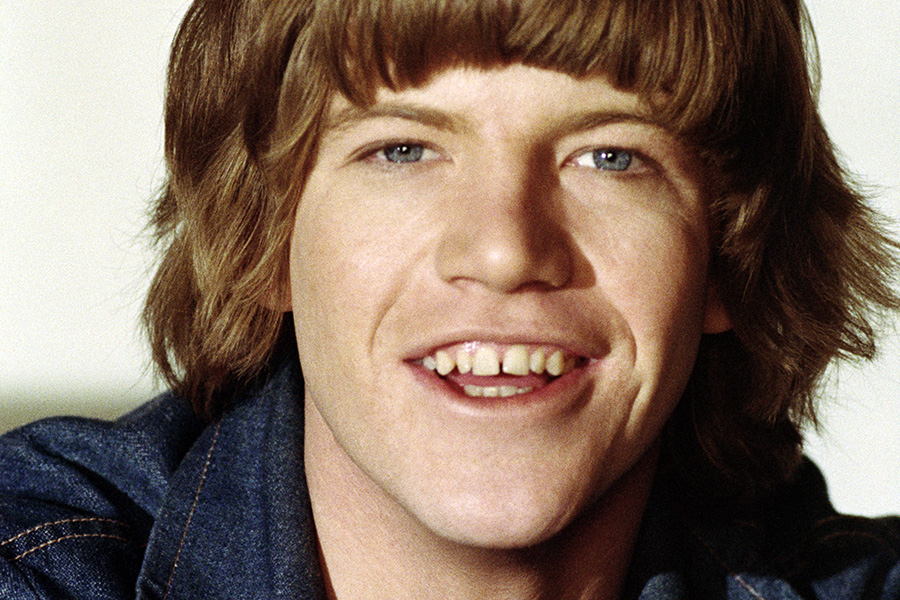
Released in November 1974, Confessions Of A Window Cleaner was an instant hit with the public. Columbia Pictures backed the film financially, with extra marketing for TV adverts and bookshop tie-ins, but the film's success was in no small part due to a familiar cast of well-loved TV, film and radio comedy actors such as Bill Maynard, Dandy Nichols and Tony Booth, with cameos from Richard Wattis, John Le Mesurier and Joan Hickson. Most of all, however, the success of Window Cleaner and the three films that followed - Confessions Of A Pop Performer (1975), Confessions Of A Driving Instructor (1976) and Confessions From A Holiday Camp (1977) - was down to their cheeky tone, light comic touch and boy-next-door good looks of the star, Robin Askwith.
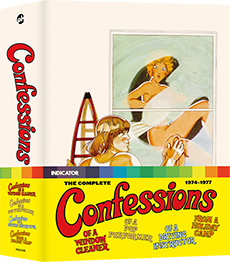
Marking the series' half-century this year, and with a meticulously restored, feature-packed word premiere Blu-ray box set released this month, we spoke to Robin at this remarkable run of films.
When you shot Confessions Of A Window Cleaner back in 1974 did you have any inkling of how big it would become? Did you look at it as just another job?
Yes, 100%. Just another job. I turned it down several times. I didn't want to do it. I started with my first film in 1968, If...., then I went to Hollywood, did Hans Brinker for NBC, and then I did Cool It, Carol!. Then Four Dimensions Of Greta, Horror Hospital, Carry On Girls and Bless This House. I was in a television series called Beryl's Lot and was already working quite successfully. Also, I felt that I took my kit off enough, and I just didn't want to do any more shagging. Not that I'd done a lot of shagging, but, hey I didn't want to do any more. So it took a long time to be talked into it really. But the script got better and better. It went from being a Michael Klinger independent film and the script wasn't that great, then it sort of increased its quality of content, and then, well the rest is history.
I signed a six-picture deal because my agent said there's only one other person who's signed a six-picture deal in England at the moment and that's Roger Moore. So, I said, well, funnily enough, Roger Moore could be the title of this film. We topped the ratings ten weeks in a row. James Bond was like 2 or 3 or something, we made more money than them in the UK. Window Cleaner was the top-grossing film of 1974.
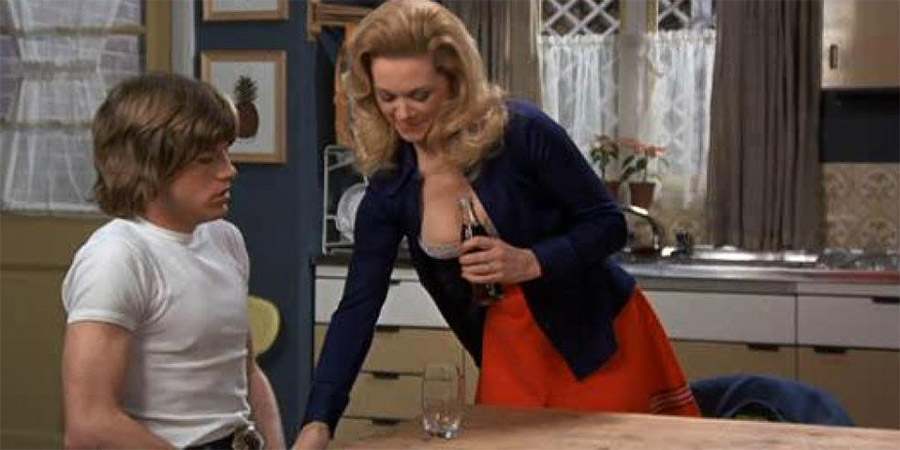
Were you surprised by how much money the Confessions films made at the box office?
I think when we were making it there was a sort of catalytic serendipitous feeling of, hang on, all these people are coming together: Bill Maynard, Tony Booth and Dandy Nichols, then Linda Hayden and Richard Wattis, John Le Mesurier, you know, and Joan Hickson. All these people, and they were being very good and the narrative was okay. And I blow my own trumpet, but they hit a bit lucky with me. Because I sort of nailed that blustering, sexual incompetent with a bit of charm.
When was the first time you thought this film might be big?
There was a feeling about two-thirds of the way through filming. The head of Columbia UK came down, a guy called Ken Maidment, and there was another guy, Tom Nicholas who was the head of Columbia Europe or something - because it was an American film, it was American money - they came down to view in those days. The old Moviola, you know, the cutting desks and the editing suites with the old Moviola, all operated with the foot. Cutting with a razor blade, bits of plastic flying all over the place. It's amazing that stuff got made.
So they came and they said to me, 'we don't need to do this, but we've got a little rough edit of a sequence', which was the bubble sequence. They said 'we've got rough edits of that. We'd like you to come and see it'. So all these people piled into the editing room at the back of Elstree Studios, so we sat there and saw this assembled footage and you just got the feeling, 'shit, this is comedically really quite good'. There was no music on it. It was just sequence, after sequence, after sequence, and then the bubbles, the dunk, and me coming out of the door. So at that moment, I thought, 'oh shit, this might be successful'.
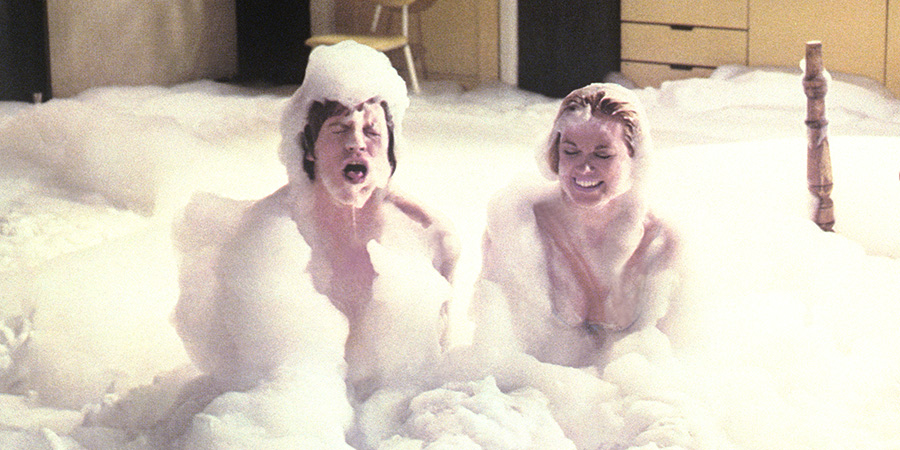
How did that make you feel?
It was work. I was well paid. It was a Columbia film. But I didn't know that it was going to lead to what it led to. I don't know if anybody did really. It was a step up from the Carry Ons. People were snaking around the block to see it at the cinema.
Do you think that because it was that step up - with an X-rating - it was something a bit more racy? Is that why people were so keen to go and see it?
It wasn't the dirty mac brigade. It was just normal people going to see it, you know, couples having a good laugh, but there was sex and there was full frontal nudity and it was made to look ridiculous. Which I don't think had really been done on such a commercial level before. Famously Gerald Thomas and Peter Rogers [the director and producer of the Carry On films] went. I think they'd only ever seen two other films in their life, and one of them was Confessions Of A Window Cleaner. They went to see what the hell was going on. This is why they then tried to play catch up with the later Carry Ons, which of course was horrible and horrific and it didn't work.
I suppose I would have carried on doing more Carry On films, but they had faded away. We sort of took over, but it wasn't necessarily a good or a bad thing. It was just part of my career really. I didn't think of it as a step up or a step back. But looking back, of course, it did change a lot of things because I didn't become as employable, which is a real paradox. I was written out of Beryl's Lot, which I loved doing, because they didn't want an X-rated actor to be associated with a 7:30pm Friday night slot. So it had a lot of negative effects, which I've sort of been fighting for and against all my life.
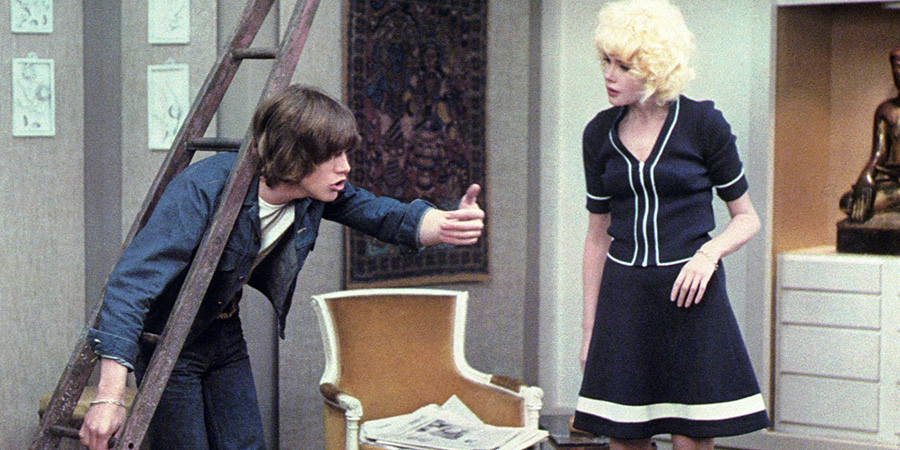
You were pigeonholed then after that?
It was all, 'It's Askwith, it's going to be saucy, it's going to be rude'. Yeah.
Did you ever think people would still be talking about it, 50 years on?
No, no, no. I mean, what is extraordinary is you look around the audience for my live shows where I reminisce and tell stories from my career, and there's quite a mix of ages and a mix of people. Warwick Smith was there and Tony Robinson and a lady had flown in from Munich. I have young people there and I can't work that out at all.
It's like a cult classic now, though, isn't it? They're cult films.
Yeah, but my show has got very little to do with the Confessions films, that's just a little part of it. But if I walk down the street, somebody will go.... 'Confessions'.
Mind you, I was in the veg shop the other day, and somebody went, 'oh, look, it's him off Benidorm'. But I only ever did two episodes, so evidently I've got that sort of face.
I watched Confessions Of A Window Cleaner yesterday for the first time in years...
Tell me what you thought.
Well, it was a lot funnier than I feared it might be. It genuinely made me laugh. And by today's standards, the sex seemed quite tame. It was funny. I genuinely laughed out loud.
It's really odd because I last saw it in 1999 when I was writing my biography. I just thought it was basically unwatchable and was so out of time. But then I watched it, obviously to lay the soundtrack for the Blu-ray and the special features, the commentary, and I must say, like you, I thought, 'oh, God, this is quite good', I thought, 'oh, my God, that's a funny scene and oh the narrative is quite good'. The music is a piece of its time.
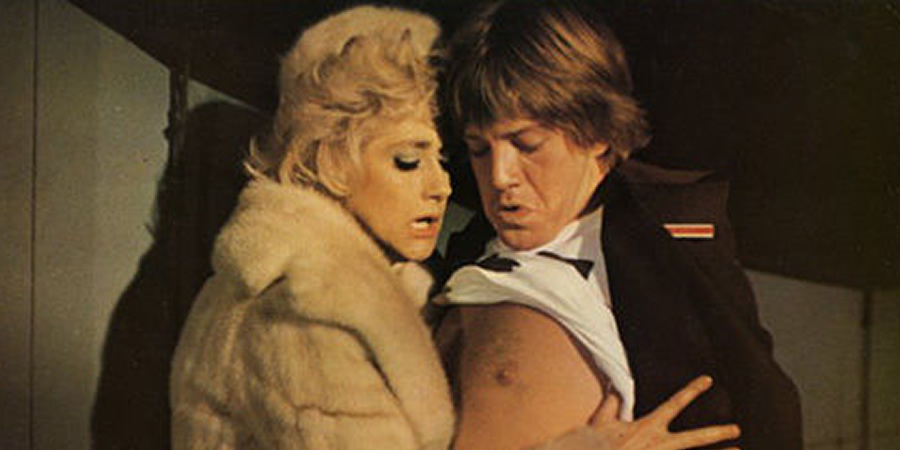
I love the theme tune, and opening sequence with Timmy on his bicycle. It's just so evocative. It looks like the 70s. And I thought I was going to really struggle with the sexism in this, but actually the women were really strong.
Oh yeah. Really strong. As you know, people like Samira Ahmed and Judy Matheson and even people I work with now, like Sally Lindsay, you know, real feminists - well, you know, Sally's always at the live gigs - they think that I managed to put women in a stronger position by being sexually incompetent. But as I pointed out to someone the other day, I was a sexual incompetent. Do you know what I mean?
It was all the women coming onto Timmy Lee, wasn't it?
Yeah, and I was just attractive enough. Even though [Full Disclosure podcast host] James O'Brien thinks I'm very good-looking.
I listened to that episode just before our talk and laughed when he asked, 'Did you always know you were good-looking?'
But that's the point. I didn't think I was. The look that I had was very 70s.
You know, I would have got work even if it was a crap actor. But I happen to think I was very good. I had a look that was just, you know, it wasn't too much. It wasn't Oliver Tobias. It wasn't too sexual. Timmy wasn't a sexual predator at all. He was a guy who was a virgin who was desperate to have some sex. He was supposed to be about 20 or 21 with lots of testosterone and he liked girls, there's nothing wrong with that. But he just didn't know how to go about it. The alpha male was Tony Booth, so I could bounce off him, doing that sort of stuff and well, for many years I played those sorts of parts really, but obviously in real life I became sexually more experienced. But I never quite got the hang of it though and I couldn't play those parts anymore.
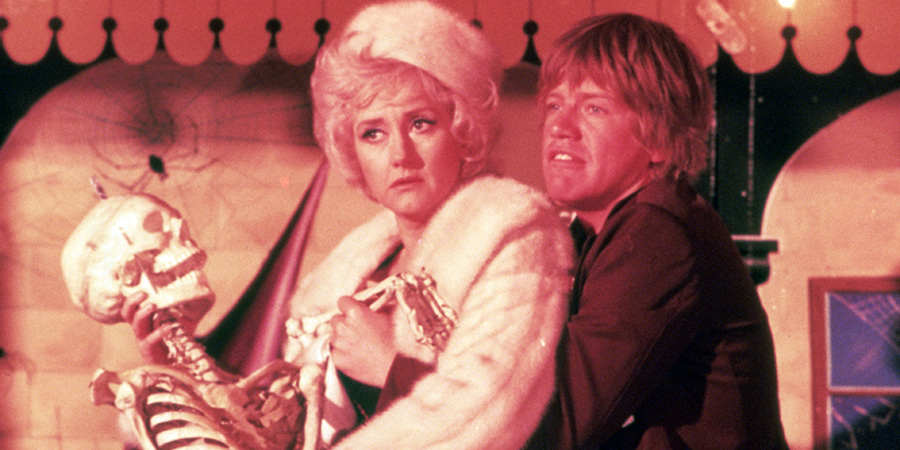
You turned Window Cleaner down originally, but everybody else did too. You were all of that class of young, good-looking, up-and-coming actors. Richard O'Sullivan, and did you say, Richard Beckinsale turned it down, and Dennis Waterman? Do you know why they did that?
For the same kind of reasons that I did. Same reasons. Just couldn't see the point of it. It wasn't very good originally. It accelerated in value and comic value when Tom Nicholas, who was the head, as I say, of something in Columbia Films, became involved. When it became a Columbia film - it was greenlit by a guy called David Begelman, who was the head of the head of the head of the head of everything at Columbia in America - it sort of changed a bit. The Americans didn't really understand the humour but the narrative got better by the time the script got back to me, and I was allowed to put things in, like the spilling of the lager.
That was one of the things that made me laugh because it was such a nice little visual gag.
But they argued with me about that for hours.
Why didn't they want you to do that?
Because they didn't think it was funny. But I was allowed to do it and then when it came to the cut, they could choose and obviously they chose to use it, which was very flattering. But the comedy was a bit of a fight.
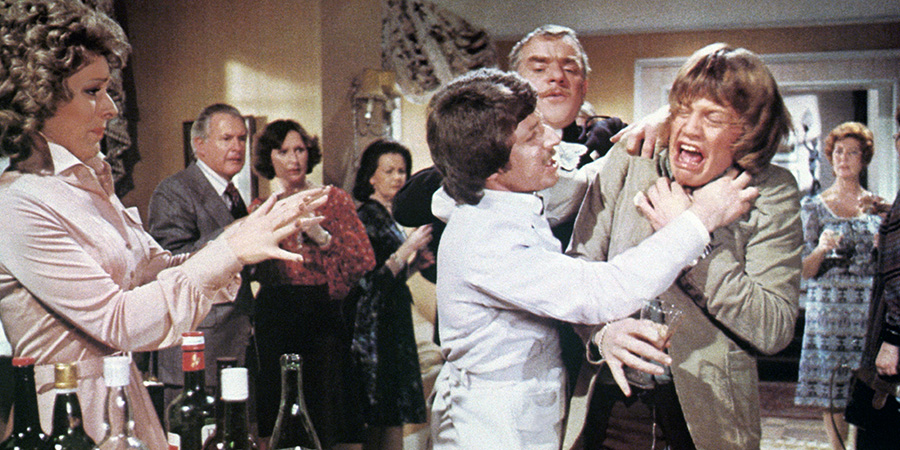
So why did you do it in the end?
Well, what happened eventually was I was out with George Layton and he said, 'Oh, God. I've heard along the grapevine that it's now become a Columbia film' and he said 'I got sent a copy of it the other day'. So they're obviously sniffing around George and he said to me, 'I think you should do it'.
In the live shows I do with George we bicker for about 20 minutes about it.
I mean, it's all slightly rehearsed, because he claims he's never seen Confessions Of A Driving Instructor, and he's in it. A lot. But yes, it was him that really changed my mind, and I thought, okay. The scripts have improved, the money was good and I had a fantastic agent, Hazel Malone, who pushed me forward and it was a studio film. It wasn't like the rip-offs, Adventures Of... and all that, which was just on location and cost 75 grand. This was 750 grands' worth, which was a lot of money in those days. So a studio film, and a great cast as well.
It was a brilliant cast with well-known names from TV comedy. I think that's why the public felt comfortable with it. Yes, it was a sex comedy, it was a bit racy, but it's got Bill Maynard in it and Dandy Nichols and people they knew off the telly.
And it wasn't very sleazy either.
No, that was something that I noted when I watched it again. It wasn't sleazy.
No, not at all. Cool It, Carol! is quite sleazy, but it's set up to be sleazy. Pete Walker the director set it up to be sleazy. Because that's what it is, a tale about two people in a city who get stuck into prostitution. There's nothing funny about anything in that film, really, but it's a very good film. But Confessions is set up to be funny and they employed actors like John Le Mesurier, people like that, who were fantastic.
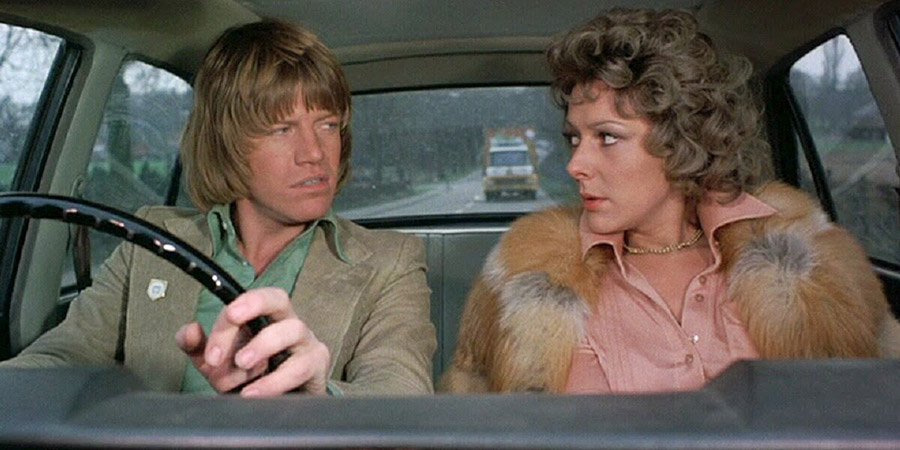
As I was watching it I kept star-spotting, remembering who was in it. It must have been interesting to talk about this on the new Blu-ray commentaries?
Yeah, it was really interesting and I was allowed to do what I wanted to do. I said, look, I've got an idea here, I don't want to be interviewed, I think I should just do like four stand-ups, and they said okay. So that's what they are. By the fourth one, I started watching them! I stopped talking and they clicked the button into the studio and asked 'Are you alright Robin?' and I said, 'Yeah, fine I was just watching this bit'. I got engrossed in watching it.
After Window Cleaner, what about the next three films? How did you feel about their quality, both at the time and now looking back on them?
Confessions Of A Driving Instructor was meant to be the second one. At the end of a film, we always planted the next film just in case there was another one to be made. At the end of Window Cleaner there's a reference to Pop Performer, but Dave Prowse, funnily enough, crosses the road and goes past a driving instructor school. So there's a little nod to what would be the next film.
I was a bit disappointed with Pop Performer because it wasn't what I had my actor's eyes set on. I could see the continuation with Driving Instructor. Whereas Greg Smith, the producer, thought, come on, we'll cash in on the whole pop thing that was going on. It's got good songs. I've seen a great Eddie Argos version of Do The Clapham on YouTube. It's absolutely brilliant, and a few bands have asked me to come and play Do The Clapham with them.
But in answer to your question, I wasn't convinced. It was going to be Confessions Of A Rock Star, and then it was Confessions Of A Pop Star. Then they wanted the innuendo, so they called it Confessions Of A Pop Performer. I don't think the narrative holds up as well. But that's my opinion. Having watched it the other day, it's a much better film than I remember. Then Driving Instructor was third, which I must say, I enjoyed more than any of them. Just because of Windsor Davies and Irene Handl, you know, and some of the comedy sequences I thought were well shot, well cut together and brilliantly performed.
And then Holiday Camp.
Well yes, then Holiday Camp, which of course, because of budgetary reasons, was shot in February. So they had to put on the narration that I say 'only Sid could think of opening a holiday camp in the middle of winter'.
It must have been freezing when you get chucked in the pool?
Actually, the pool was heated, because I kept getting thrown in it and I had to be in it a lot! So that was heated. I think the whole budget of the film went on heating the pool.
They shot the holiday camp locations first and the studio scenes later. It was the wrong way round.
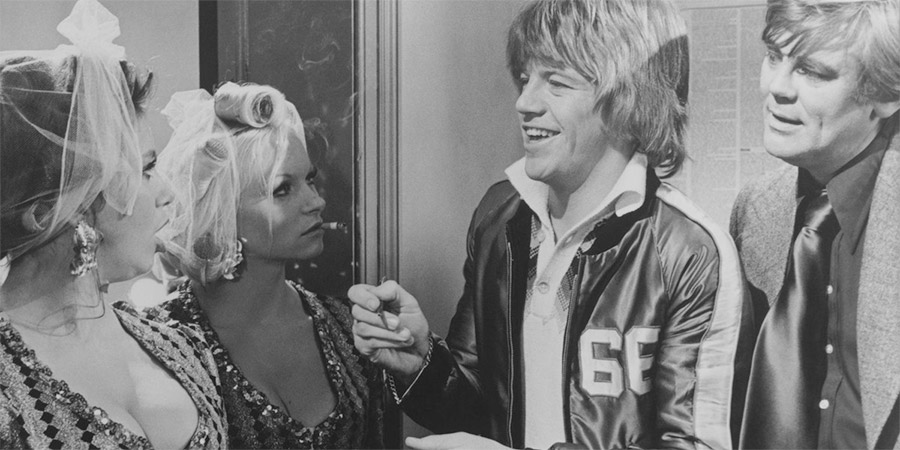
It was a six film deal but you only made four. So what happened to the other two? There were meant to be Confessions Of A Plumber's Mate and Confessions Of A Private Soldier, weren't they?
There was also a very good script called Confessions Of A Haunted House. I think I say in my autobiography that I got shaggers' block. I was having to make sex funny and when I'd run out of ideas I thought that the joke had been done. We were still making money so it was a great time to stop. It wasn't quite a Fawlty Towers moment, but we stopped at the right time. And it was prescient because sex comedies really did fall away after 1978. I would like to think maybe they didn't have us spearheading it all.
We got out at just the right time. Then of course, we did a live Confessions show, which was pretty brave at the time because I was sort of struggling/not struggling for work. I never stopped working, but it moved my career in a sort of strange direction.
What happened after the films stopped?
I did the live Confessions show from 1977 right through to 1982. The shows were packed and we were playing in places like the Theatre Royal, Norwich - you know, proper theatres. The show was written and it was awful, so I deconstructed it and this is where we all fell out; me, Val Guest (the director) and Greg Smith (the producer), because I said, I can only do this if I come in front of the audience and say, 'I apologise for what is about to happen'. Like a bit of a stand-up. And say, 'You're about to see the worst show. But there are pluses. There's nudity.'
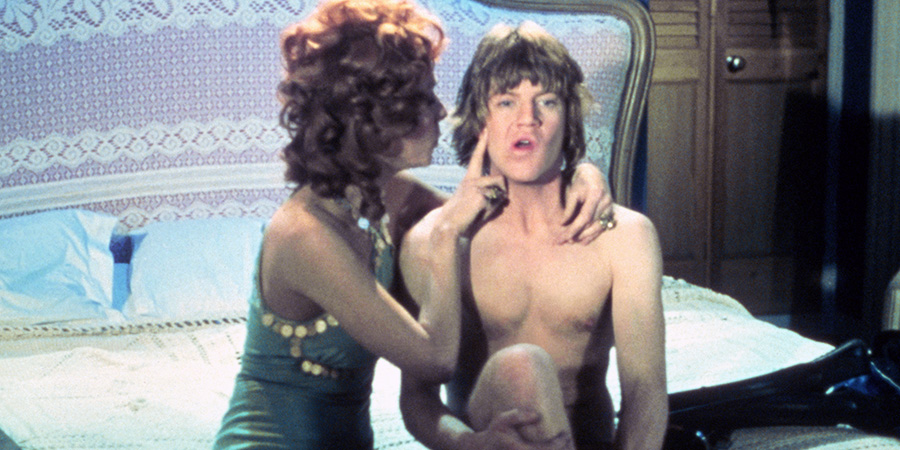
The comic business was wrapped around the nudity. It wasn't quite as clever as Stewart Lee, but I did sort of strip it all down to what they were going to see, and it was awful and sexist. At one point in 1982, I had such an argument with the producer because he wanted more nudity in the middle of a scene. So I got a girl to come on and take her clothes off for no reason at all, then I flew in a sign that said 'gratuitous nudity' and he went fucking ballistic. Anyway, it packed them out.
What did you learn doing the live shows?
I had another skill, I could actually talk to an audience. Barry Cryer, who seems to have been a mentor for everyone, he got me slightly wrong. He thought I should be more of a comedian, but I don't like telling jokes. I don't like jokes, I like stories and I'm lucky enough to be able to tell them. People like Billy Connolly, Stewart Lee now, Peter Ustinov, David Niven, Peter O'Toole - people who can tell a great story - were more for me. So, Barry was right in the sense that I was able to step forward and talk in a show and make it entertaining and then go back into it. It was sort of, dare I say it, a little bit ahead of its time. But we took the live Confessions show worldwide.
There's been a renewed affection for the films recently and you've had a resurgence in your own career. Are you proud of the Confessions films when you look back at them, or do you regret making them?
Well, it's not regret, I have to say. Now I'm able, as you've seen, to stand back and say what I think, tell some stories wrapped around them. And I don't want to upset the hardcore fans, who you see at the live shows. They're there. They've got Askwith Army T-shirts. So I don't want to upset them because they're fantastic. I give them a version of how it's part of my career, but it's not the highlight of my life. No, no.
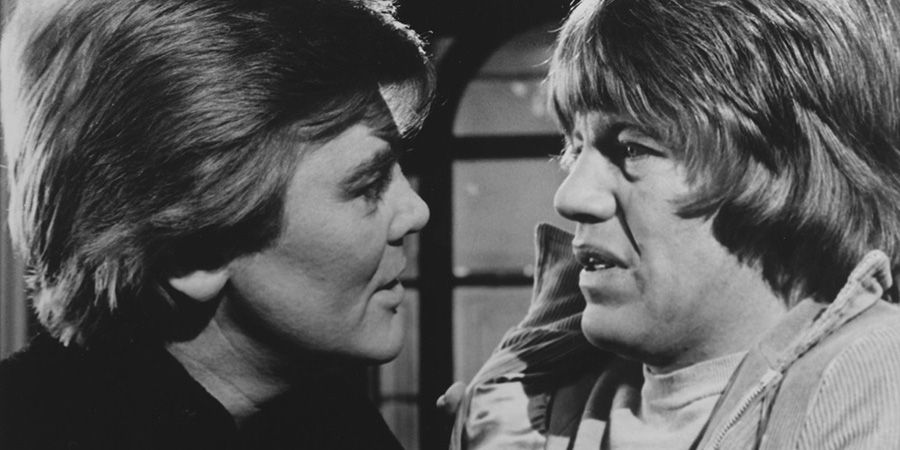
On Full Disclosure the host quoted you: 'If I'd had my time again, I would have turned the Confessions films down to see how my career would have turned out without them.' Do you ever think how things would have turned out if you hadn't done them? Like a sliding doors moment?
Well yeah, but there's no regret in it. There's no bitterness. No, I've never wanted to be one of those actors.
Curiosity though?
Curiosity definitely. Definitely. But I think I would have been successful anyway. I was arrogant enough and had enough self-belief. I would have been successful. I would have gone to the RSC. But, you know, there's always been something a little bit commercial about this. So, I think that I would have been lured into something dreadful somewhere. That was just part of it. But yeah, I do wonder. I do wonder because I would have definitely done more serious stuff.
As is so often the case, what the public loved the critics hated, with one describing the Confessions films as "puerile sex farce": but the films continued to make money for years after they were released, helped by Columbia releasing them on the American market. Come the end of the decade, British sex comedies were still being made but for this genre, ultimately the bottom had dropped out of market - as it were! The Confessions series may not have been the first but they were undoubtedly the most successful of the genre.
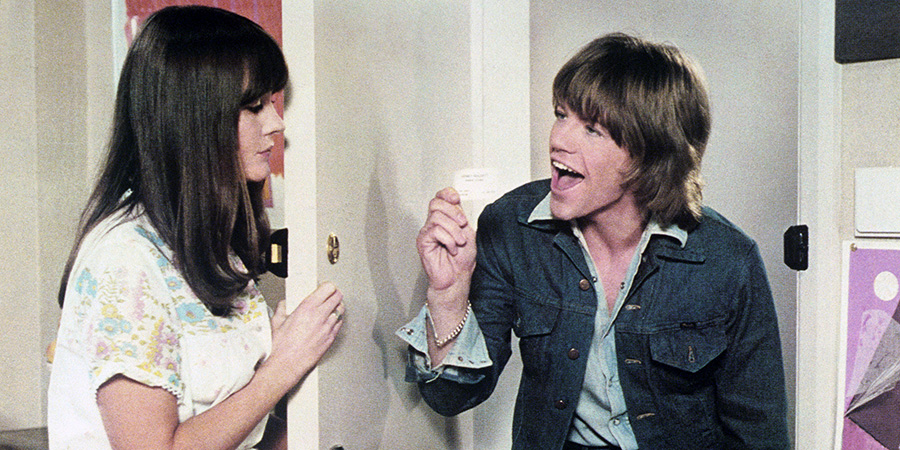
Strangely, the films weren't shown on television until the advent of Channel 5, which aired all four shortly after its launch in 1997. Now they have reached cult - almost legendary - status, helped by Robin's fabulously candid live shows, leading in no small part to a well-deserved resurgence in his career.
Watching the films today, one is immediately struck by how much fun they are, and how much humour was packed in. Yes, there are boobs and bums on show, but here the comedy aspect of the sex comedy genre was truly front and centre. In comparison to the film and television output we are now used to seeing, the sex now seems tame; almost a seaside postcard. It's neither erotic nor sleazy - it's a silly laugh, and that's probably why we still have an appetite for watching and celebrating them.
As the opening theme of Confessions Of A Window Cleaner declares, 'This is your life, Timmy Lea'. Looking back now, it was a pretty funny one.
The Complete Confessions is now available to order from Powerhouse. It includes all four Confessions films in HD, and the similar Rosie Dixon - Night Nurse, adapted from a female character-centric companion series of novels by Christopher Wood.
Askwith Flares Up live shows are produced by Misty Moon. Upcoming performances include London, Manchester, Leeds, New Milton and Braunton.
Help us publish more great content by becoming a BCG Supporter. You'll be backing our mission to champion, celebrate and promote British comedy in all its forms: past, present and future.
We understand times are tough, but if you believe in the power of laughter we'd be honoured to have you join us. Advertising doesn't cover our costs, so every single donation matters and is put to good use. Thank you.
Love comedy? Find out moreThe Complete Confessions

Robin Askwith (Britannia Hospital) stars in The Complete Confessions, 1974 - 1977, the definitive collection of the celebrated British sex-comedy series. Based on the pseudonymous Timothy Lea novels by screenwriter Christopher Wood (The Spy Who Loved Me), each instalment follows the fortunes of the feckless and accident-prone - yet seemingly irresistible - Timmy (Askwith) as he gets embroiled in the money-making schemes of his brother-in-law Sidney Noggett (Anthony Booth).
The fun starts in Confessions Of A Window Cleaner (1974), as Timmy must satisfy the demands of a clientele of lonely housewives whilst attempting to woo police officer Liz (Linda Hayden, The Blood On Satan's Claw). In Confessions Of A Pop Performer (1975), Timmy endures the ups and downs (and ins and outs) of the music business when he joins a band managed by Sid. With Confessions Of A Driving Instructor (1976), Timmy finds his female students fumbling for his gearstick. Finally, in Confessions From A Holiday Camp (1977), entertainment officer Timmy struggles to organise a beauty contest under the watchful eye of the camp's tyrannical new manager.
Directed by Val Guest (Casino Royale) and Norman Cohen (Stand Up Virgin Soldiers), this classic quartet features a supporting cast of British comedy greats, including Bill Maynard (Oh No It's Selwyn Froggitt), Doris Hare (On The Buses), Windsor Davies (Never The Twain), John Le Mesurier (The Wrong Box), and Liz Fraser (Adventures Of A Taxi Driver). As beloved by audiences as they were reviled by critics, the Confessions series sparked a string of imitators, and stand as a time capsule of the fashions and attitudes of 1970s Britain. Along with an array of new commentaries and interviews, this Blu-ray premiere collection also includes producer Greg Smith's follow-up feature film, Rosie Dixon - Night Nurse, which was adapted from Christopher Wood's Confessions Of A Night Nurse.
This world premiere Blu-ray release includes the four Confessions films in high definition, and Rosie Dixon in standard definition.
First released: Monday 26th August 2024
- Distributor: Powerhouse Films
- Region: B
- Discs: 4
- Subtitles: English
- Catalogue: PHILE360B
![]() Buy and sell old and new items
Buy and sell old and new items
Search for this product on eBay
BCG may earn commission on sales generated through the links above.

